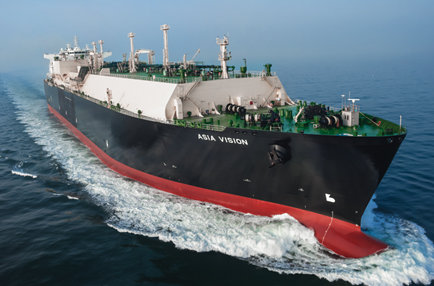
The U.S.’s first liquefied natural gas export is headed for Brazil.
Chevron-owned LNG tanker Asia Vision, built in 2014, docked Sunday at Cheniere Energy’s Sabine Pass export terminal in the U.S. Gulf, according to Lloyd’s List. The terminal is located in Cameron Parish on more than 1,000 acres of land along the Sabine Pass River. The location borders Texas and Louisiana.
The site reports that another LNG carrier built last year, the Kanellakis Group-owned Energy Atlantic, has been waiting since January to load cargo from the terminal, but the export schedule has been delayed.
Brazil’s state-owned energy company Petrobras is scheduled to receive the first cargo of shale gas, a person familiar with the deal told Bloomberg.
The shipment of liquefied natural gas was agreed to Monday, said the person, who asked not to be identified because the information isn’t public. Cheniere Energy Inc. began loading the first tanker at its Sabine Pass terminal in Louisiana, U.S. Coast Guard spokesman Dustin Williams said in an e-mail Tuesday.
“The biggest buyer of LNG outside of the winter is Brazil first and Argentina second in the Atlantic Basin,” said Ted Michael, an analyst for energy data provider Genscape Inc. “They buy LNG for gas-powered, air-conditioned power.”
Cheniere rose 1.5 percent to $30.77 at 3:24 p.m. in New York after earlier gaining as much as 6.5 percent.
America’s first LNG export will hit the water just as global supplies begin to swell, weighing on prices. Other gas-export projects are expected to come under pressure to secure financing and long-term contracts amid the global commodity rout and shifts in demand overseas, Daniel Yergin, vice chairman of the energy consulting group IHS Inc., said in an interview Feb. 17.
Demand is forecast to be higher in South America during the spring, in part due to a drought that has increased Brazil’s dependence on the power-plant fuel. Brazil has increased LNG imports in the past few years after an agreement to buy gas via a pipeline from Bolivia reached its limits. Petrobras bought about 80 LNG cargoes last year. It’s expected to purchase another 50 in 2016, according to Porto Alegre-based Gas Energy consultancy.
Petrobras had no immediate comment on the shipment. Cheniere didn’t respond to an e-mail and voicemail. Initial exports will be considered commissioning cargoes as part of the start-up process to ensure the terminal is fully operational. Once that’s complete, Cheniere will need approval from the Federal Energy Regulatory Commission to operate the export terminal commercially.